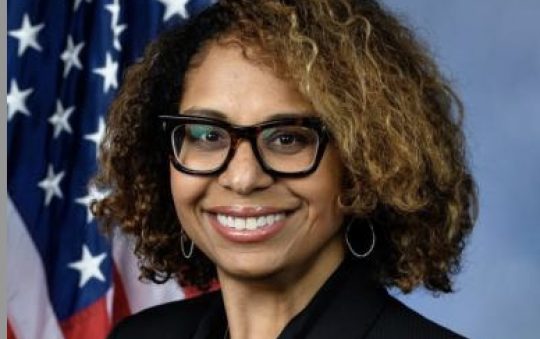Capitol Hill has been in deep deliberation, designing the George Floyd Justice in Policing Act, as of Wednesday, June 17 the House Judiciary Committee continued the markup of the police reform measurement; instituting law enforcement accountability for excessive force and police brutality targeted within the black community.
Chairwoman of the Congressional Black Caucus Karen Bass had a hand in drafting the George Floyd Justice in Policing Act unveiled on June 8, the first ever “Bold, comprehensive approach to hold police accountable, and change the culture of law enforcement and our communities.” Within the press release, Chair Bass stated,
Chairwoman of Congressional Black Caucus Karen Bass, (Photo from House of Bass Website)
“What we are witnessing is the birth of a new movement in our country with thousands coming together in every state marching to demand a change that ends police brutality, holds police officers accountable, and calls for transparency. For over 100 years, Black communities in America have sadly been marching against police abuse and calling for the police to protect and serve them as they do others. Today we unveil the Justice in Policing Act, which will establish a bold transformative vision of policing in America. Never again should the world be subjected to witnessing what we saw on the streets in Minnesota with George Floyd.”
The Justice in Policing measurement covers discriminatory profiling and mandates training on racial discriminatory acts for all Law enforcement. It bans chokeholds, carotid holds and no-knock warrants. The George Floyd Justice in Policing act limits the transfer of military-grade equipment to state and local law enforcement. The measurement mandates the use of cameras for federal offices and establishes National Police Conduct Registry to halt the traveling of problematic officers across counties.
This benchmark orchestrated by Chair Bass amends the criminal statute from “willfulness” intent to a “reckless” standard to successfully identify and charge police misconduct. It challenges qualified immunity, so individuals do not escape federal punishment due to violation of constitutional rights. Chairwoman Bass wanted to highlight the positive steps the bill brings for communities, within this measurement neighborhoods will be awarded grants. local government will be encouraged to reflect on their use of police in cases that call for “equitable public safety approaches.” The bill is designed to transform policing and cultivate intelligent public safety.
This bill looks to build the trust between law enforcement and communities, outlining and reform signs of systemic racism. The core factors of the bill are looking to establish a national standard for the operation of the police, manage data between the community and law enforcement, redirect existing funds to invest in community policing programs, and prosecution within law enforcement that carry out excessive force or violate any constitutional rights. The platform of this bill stands on transparency and building trust between the people, and those who are sworn to protect them.

Within the hearing today, the state representatives shed light on different points of the amendments drafted. The safety of law enforcement and the public on the forefront, the bill brought the subject of race and protocols of traditional policing to order. Chair Bass during a quick phone interview as the committee were discussing the bill made a point to say, “This is not the time for superficial action.”
There were powerful words thrown across the board from Representative Cedric Richmond explaining his identity as a Black man in America to the passionate words of Representative Ted Lieu, “I want my Republican colleagues to understand why it’s offensive, at this hearing about the killing of black Americans by the government, you’re talking about freaking Michael Flynn? And you talk about Google and Twitter, and you’re talking about protests in Seattle, things that have nothing to do with our government murdering black Americans,”

There is a similar bill presented by Senator Tim Scott that also calls for police reform, the Justice Act was released days after the presidential executive order that incentivize police reform. The measurement looks to leverage federal funding for departments to prohibit chokeholds along with other revisions. The Justice Act proposes to run studies, collect data, and research racial disparities within the black community.
Some major differences between the two bills include, the measurement initiated by Senator Scott, does not include the amendment of qualified immunity, which largely shields police force from any liability. Senator Scott’s bill entitled the Justice Act does not eradicate the no-knock warrants in drug cases, this particular practice ended the life of Breonna Taylor who would have been 27 last week. Chair Bass commented on the Justice act, she stated this bill “has no teeth.”
Within the conversation between legislators supporting the George Floyd Justice in Policing Act, the general tone was this day was long overdue. The House Judiciary Committee passed the George Floyd Justice in Policing Act, by a vote of 24 to 14. Capitol Hill has responded to the demands for police reform, the goals are set to ensure equality, community safety, and to hold those accountable who abuse power and act out excessive use of force. This following Thursday, the bill is looking to reach the floor of the house for a full vote and proceed to making strides to a new culture of policing, bringing a moment of meaningful change.







